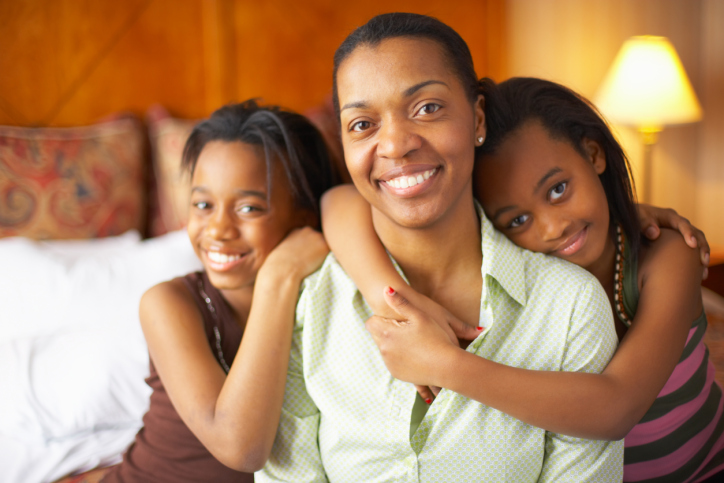
If you have children chances are, you’ve felt the pressure to “snap back” to your sexy, pre-baby body within weeks of popping out your beloved little one(s) – a la Beyoncé, Kourtney Kardashian, Kelly Rowland – the list goes on. Only, reality knocked on your door and said ‘not happening.”
READ: Keke Palmer Promotes Having a Positive Body Image
Naturally, this may cause you to grow frustrated and begin to express negative feelings in regards to how you see yourself -- how you feel in your body. Unfortunately, as a caregiver, if you're not cautious when addressing your own attitudes towards food, exercise and body image, it can take a toll on your children -- negatively. So how do you build a healthy body image in children, while struggling yourself?
Live by example.
Nearly two years ago, I ended a long-term relationship. One of the hardest decisions I’ve made in a while, considering the time invested, recently giving birth to our child, and already having one failed marriage under my belt. Those close to me, know that for quite some time, I really struggled with my self-esteem and rediscovering myself. I even played around with the idea of a little nip here and tuck there.
Only issue is, these thoughts impacted the way I saw myself as well as spoke about myself – in front of my kids. Needless to say, it wasn’t long before I caught my 9-year-old daughter hop on the scale behind me or begin to question (since she is often compared to me) whether she was the epitome of perfection, as I always declared her to be.
It’s no secret that women often internalize cultural values, such as the importance of being thin. But what gets lost in the shuffle, is how those feelings (if expressed) can have a negative impact on how your child views their body image. So, one must live by example. Using words like “fat” or “diet” on the regular. Stop!
Young children, especially girls, are impressionable and susceptible to following in mommy’s footsteps, so teach them to be comfortable with their developing bodies. Make a point to use phrases like “you are beautiful, inside and out." It's also essential to educate your kids that:
- Healthy bodies come in all shapes and sizes.
- Your pant size and waist line do not predict happiness, success, or health.
- You are more than a number on a scale – you are equipped with unique talents and skills.
- Images in the media are unrealistic and created mainly to sell products.
Discuss a healthy lifestyle.
Although many argue that how one views themselves often begins with affirmations from loved ones – it’s also important to discuss living a healthy lifestyle: what to eat, what not to eat, exercise, and how those things affect the way your body looks and feels. Over time, this will create habits in your children which they will use through adulthood.
READ: Eat Your Way To Healthy Hair & Glowing Skin
Not sure what’s good? Vegetables, fruits, whole grains, proteins, and dairy products are always a good place to start and they’re necessary for growth and development.
Provide “body positive” images.
When my eldest daughter struggled with embracing her kinky coif, I found it useful to show her images of other kick ass women rocking afros and WINNING. Sure, she was hesitant at first – “they can do that because they’re famous,” she said. But after showing her how versatile her hair could be when styling, she grew to love it. Today, she calls her ‘fro “rock star.”
I believe this formula is beneficial for most parenting woes. Many children are visual learners. By providing them with a picture, you’re not only reinforcing the lesson but showing them they are not alone. This ties back to educating kids that healthy bodies come in all shapes and sizes.
No matter the age, growing comfortable in one’s skin may always prove to be a challenge -- as age, pregnancy, and trends have a nasty way of affecting our views. Fortunately for our children, they can look to us from an early age to get a handle on how to build a healthy body image.



